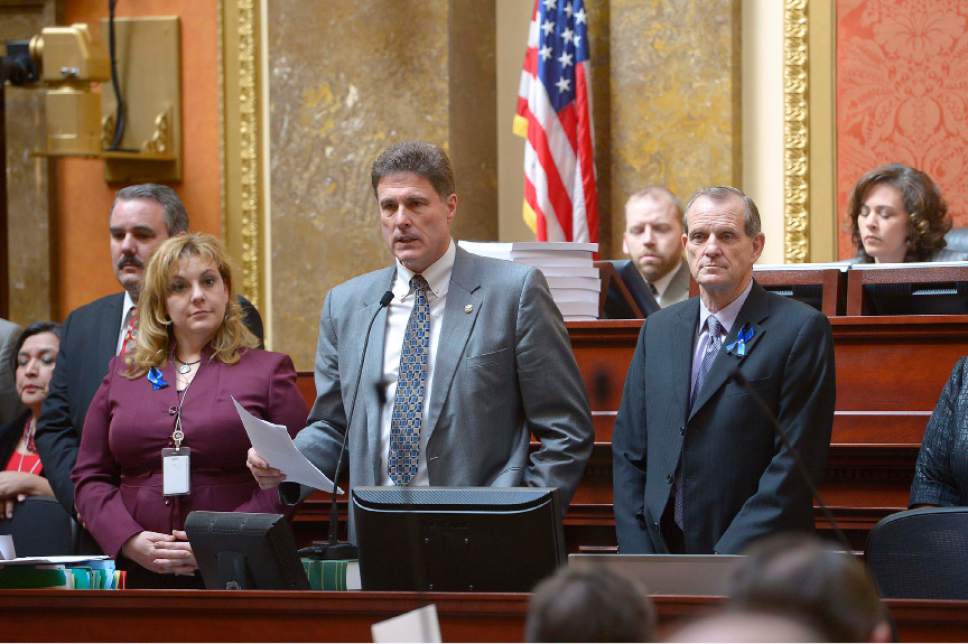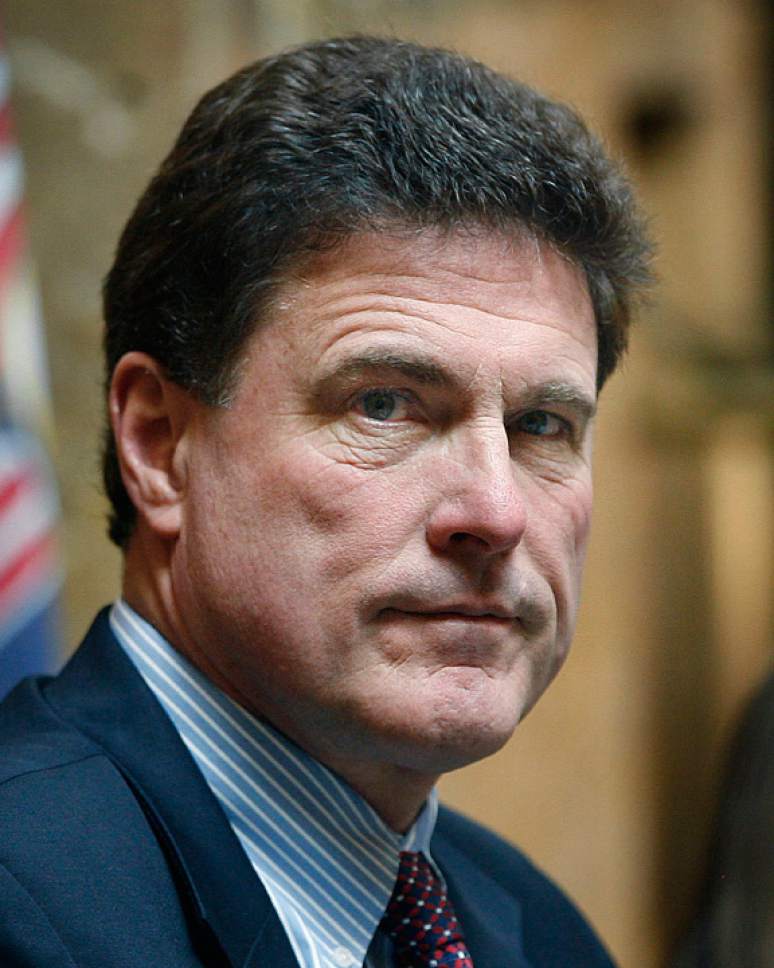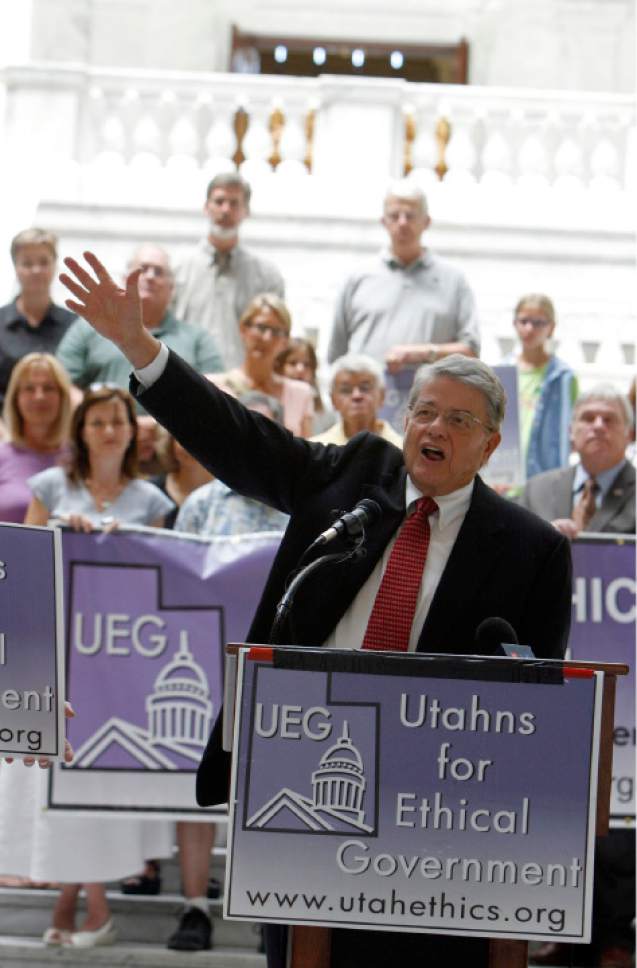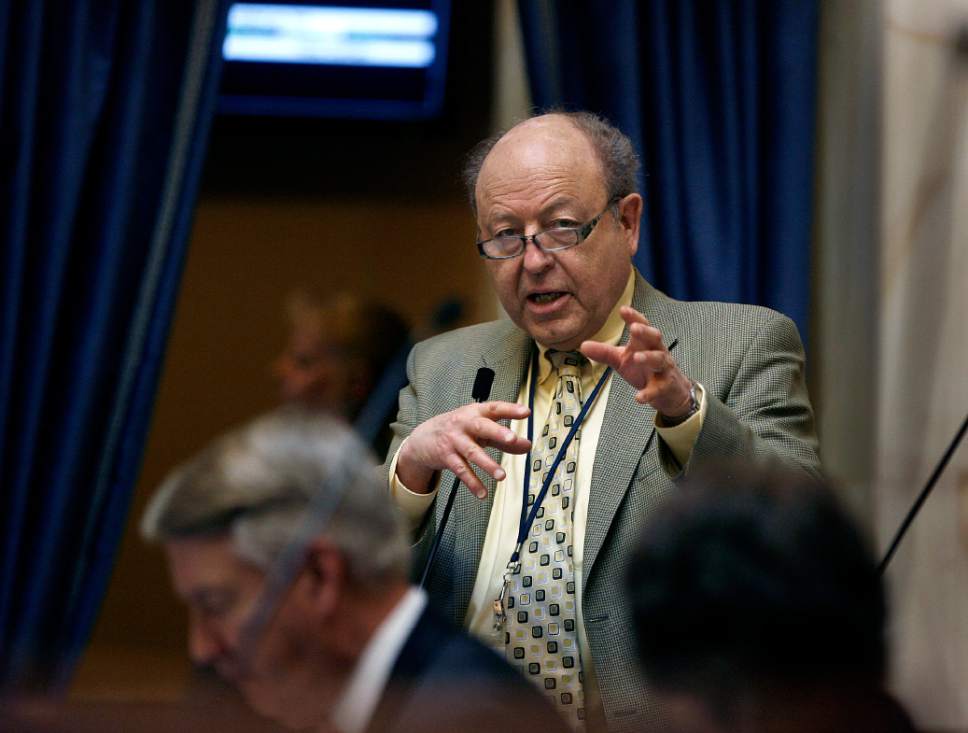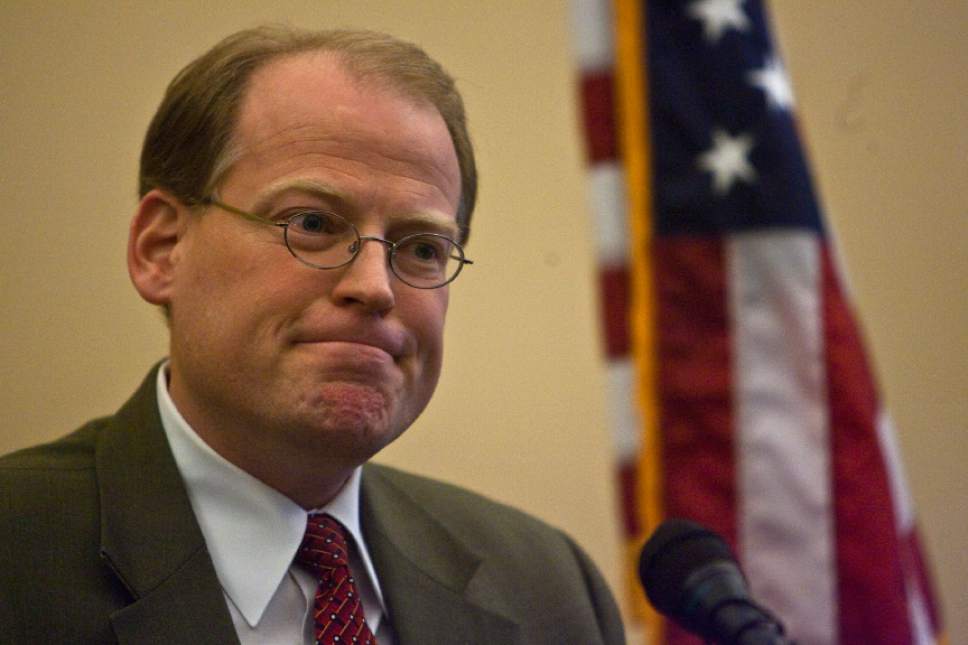This is an archived article that was published on sltrib.com in 2015, and information in the article may be outdated. It is provided only for personal research purposes and may not be reprinted.
Rep. Kraig Powell, R-Heber City, doesn't accept campaign donations from special interests.
"But some still send money," he says. "It comes without asking. So I send it back."
Maybe such easy, unsolicited giving is why 82 percent of the donations accepted in 2014 by incoming members of the Utah Legislature came from special interests, according to an analysis by The Salt Lake Tribune.
In fact, 25 legislators — about a quarter of the total — received every penny of their 2014 donations from special interests such as lobbyists, corporations, business leaders, advocacy groups and political-action committees
Meanwhile, 7 percent of all campaign donations came from regular constituents to their own senator or representative.
"It's rather shocking that so much of the money comes from organized interests rather than individual donors," says David Magleby, a political science professor at Brigham Young University.
"Sure, constituents vote for them [legislators], but they secure the nomination and election in large part due to superior resources which they have over their opponents," Magleby says. "And those resources come from interested parties."
That, of course, raises questions about whether lawmakers focus more on the needs of their constituents or on special interests, and what those special interests are buying with their money.
—
Analysis • Amounts raised by legislators are much smaller than for congressional or statewide-office candidates. Their districts are usually small, and campaigns rarely buy expensive TV or radio ads. They focus more on cheaper lawn signs, billboards and mailers.
So, the 102 legislators (out of 104) who accepted donations in 2014 raised a combined total of $3.4 million, or an average $33,568.
Nearly $2.8 million of the total came from special interests, 82 percent. Just 7 percent, some $237,370, were donations from constituents to their own legislators. The rest came from candidates themselves or family and friends.
Among the top donors by groups were the Utah Association of Realtors, $147,865; EnergySolutions, $69,759; Education First (a group pushing for increased school funding), $68,500; Reagan Outdoor Advertising, $57,444; and the Utah Hospital Association, $49,300. (A list of more top donors is online at sltrib.com).
By industry, health care gave the most: $317,906. It was followed by the finance industry, $249,182; real estate, $222,273; political party arms (which in turn get most of their money from special interests), $214,220; the energy industry, $184,850; and fellow politicians (who often use money they raised mostly from special interests to campaign for leadership posts), $155,066.
Lawmakers accepted significant amounts from unpopular industries.
The tobacco industry gave $41,000; the beer industry kicked in $12,475; and the payday-loan industry — which was central to scandals that toppled former Attorney General John Swallow — handed out $14,500.
—
100 percent special • Analysis shows that 25 legislators, about one of every four, received all their campaign donations from special interests.
Senators on that list included: Allen Christensen, R-North Ogden; Wayne Harper, R-Taylorsville; Deidre Henderson, R-Spanish Fork; Lyle Hillyard, R-Logan; David Hinkins, R-Orangeville; Scott Jenkins, R-Plain City; Pete Knudson, R-Brigham City; Mark Madsen, R-Eagle Mountain; Ralph Okerlund, R-Monroe; Aaron Osmond, R-South Jordan; Luz Robles, D-Salt Lake City; Brian Shiozawa, R-Cottonwood Heights; and Jerry Stevenson, R-Layton.
Several of those senators did not face election in 2014, but accepted donations.
Representatives, all of whom ran last year, on the list included: Stewart Barlow, R-Fruit Heights; Mel Brown, R-Coalville; Jon Cox, R-Ephraim; Jack Draxler, R-North Logan; Jim Dunnigan, R-Taylorsville; Keith Grover, R-Provo; Steve Handy, R-Layton; Brad Last, R-Hurricane; Kay McIff, R-Richfield; Val Peterson, R-Orem; Paul Ray, R-Clearfield; and Marc Roberts, R-Santaquin.
None of those 100 percenters was an incoming freshman. Special interests tend to give mostly to incumbents — who have shown they can win races, have higher election-success rates, and already influence policy.
Ryan Kirkham, the 2015 president of the Utah Association of Realtors, expresses a view typical among industry groups.
"If we have an incumbent who is doing a good job by supporting the issues of homeownership and private-property rights, we're not going to mess around with that."
Adds Kirkham, "If we support the new candidate ... [the incumbent] is going to be mad."
Some of the 100 percenters explain how they are on the list.
"I never asked for any of it. It was just sent to me. And some I turned back. Historically, I've never taken any tobacco or alcohol money, but just turn it back," says Hillyard, the Senate budget chairman, who ran unopposed last November. He is the Legislature's longest-serving member at 34 years and counting.
He says he has tried to do some fundraising with constituents, "And universally the reaction I get is people say, 'Are you kidding? You don't need to campaign.' " So he uses the money that arrives unsolicited from special interests to cover expenses.
Dunnigan, another 100 percenter, is the newly elected House majority leader. He did receive some donations from neighbors, he says.
"But they happen to own businesses, so they contribute from their businesses." Federal law prohibits donations to candidates directly from corporations in congressional and presidential races, but Utah is among the few states that allow those contributions in state and local races.
"Normally I … solicit campaign contributions from people in my district. I did not this [past] year because I did not have an opponent," Dunnigan says. "That's probably why I'm on the zero list."
—
Donation motivation • So why do special interests give?
"The obvious answer is because the special interests get some benefits from it," says Kim Burningham, a onetime legislator and former chairman of Utahns for Ethical Government.
"How can you take $500 or $5,000 from a special-interest group and then not listen to them? Access is what they are buying. Maybe they are interested in buying more than access, but I think access is the main thing they get."
Magleby, the BYU professor echoes, that. "The most important thing they get is access, and access is meaningful."
Kirkham, with the Utah Association of Realtors, strongly disagrees.
"We don't buy access. Nobody can. We don't give stipulations," he says. "I've handed people checks, and all we say to them is, 'We appreciate your public service.' We don't call them later and say, 'Remember we gave you this — wink, wink.' We don't do any of that."
Realtors simply seek to support people who are "honest, good, ethical policymakers who support homeownership" and small businesses, Kirkham says.
Whether or not special interests seek to buy access, some lawmakers say that's the effect.
Powell, the legislator who declines special-interest money, gives an example from a busy day recently when he failed to immediately return a phone call from a lobbyist.
"When I ran out of the office and did not return that phone call, I thought, 'I am so glad I did not accept money from that group.' If I had, I would have felt it necessary to return that call as soon as possible, and give their view some important weight."
Not accepting such donations, he adds, "definitely gives me more freedom and independence."
Other lawmakers say they try to listen to everyone.
"Whether or not someone has contributed, I will meet and listen," Dunnigan says. "I'm always looking to further educate myself and look for better ways to do things."
Hillyard says to avoid any improper influence or access, he deliberately avoids looking at his donor list and refuses to accept money from anyone who tries to give it during or after a meeting on issues.
"I hope no one buys any special access to me by donating to my campaign," Hillyard says. Rather, he hopes they donate because they "feel like I am doing a good job and there is some support."
But well intentioned or not, Magleby says big special-interest money in elections makes voters cynical, sometimes with good reason.
He notes that in the scandals that toppled Utah's former attorney general, Swallow is accused of taking legal stances or engaging in other activity in exchange for donations.
"We have strong reason to believe in the Swallow case that [contributions] led to some intervention with state agencies," Magleby says. "Could it also happen in legislative hearings?"
—
Constituent money • Why don't legislators receive more money from their voters?
"I suspect it's because they don't ask," Burningham says, recalling that when he was a legislator, he reached a point that he felt taking special-interest money was inappropriate. So he sent letters to constituents seeking money instead.
"I always got ample money to run my campaign," he says. "It took a lot of work."
Powell has a similar experience. "I have found that citizens will willingly donate to their own representative's campaign, especially if they know they have taken a pledge not to take special-interest money."
The system might be healthier — and voters would have more trust in it — if more lawmakers turned to the people in their districts than special interests, Magleby says.
"It would reinforce that representational relationship that should exist between constituents and representatives," he says. That's a contrast to the existing political culture in Utah, where "politicians go for the low-lying fruit, and the more easy and efficient way to raise money is from organized interests — and they are more than happy to oblige."
Twitter: #LeeHDavidson


